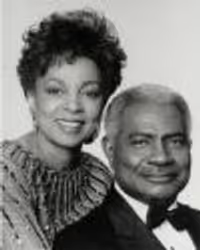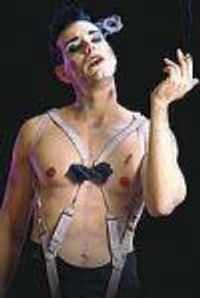Religious Actors
#1Religious Actors
Posted: 3/4/07 at 7:34pm
A fellow actor friend and I were having this discussion earlier and I was curious to know how the BWW community, primarily Christian or Spiritual or Religious actors feel…. (I don’t want to be too specific) Is our profession acceptable in God’s Eyes. I am a spiritual male. I believe in God, I believe that Jesus is his son and I pray often. I also study my bible. Yet over the past year I have played a drug dealer, pedophile, and I often find myself cursing in scenes/shows that I am assigned/cast. I am more of a character actor and as much as I dislike playing the creepy and sick characters in shows, I always receive accolades and have even been typecast for doing such a well job as an actor. I really do my homework no matter what part I’m given, but in bringing these sinful characters to life there is always some guilt and shame involved. I know that I don’t live the lifestyle of that character but is imitating sin on stage and film a sin? It’s somewhat of a difficult place to be because the Christian lifestyle can be quite close-minded and conservative. Like all actors, I want to find work, and I want to be successful, but should I turn down the role of a lifetime because of a sex scene? It’s just a confusing issue to talk and think about. Especially in a profession where so much shunned in my religion is accepted. Don’t get me wrong I am not judgmental about what anyone does, but I really want to be successful and not compromise who I am in doing so. Are there any actors out there who understand where I’m coming from?
Yankeefan007
Broadway Legend Joined: 3/20/04
#2re: Religious Actors
Posted: 3/4/07 at 7:41pm
Let me begin by saying that I'm Jewish. And I'm not an actor.
In terms of spirituality, it's all up to your own personal belief system and what your own Higher Power dictates.
The good thing about acting is exactly that. You're not being yourself, you're acting as a character. You're not doing anything wrong, the character is.
If you're that uncomfortable playing risque parts, then it's going to be hard in the acting profession. However, if you've done it before, then you can do it again.
Just remember that if YOU are spiritual, the Higher Power will look kindly on that (if that is indeed what you believe).
Do I make sense?
#2re: Religious Actors
Posted: 3/4/07 at 7:41pm
Hey!
I am a Christian as well and would love to discuss things with you. I know of many many Christian artists in the theatre who are able to work and still feel like they are pleasing to God. PM me and we can talk.
Timmy
#3re: Religious Actors
Posted: 3/4/07 at 7:41pmYou could pose that question to the profs in the Music-Dance-Theatre program at BYU...
#4re: Religious Actors
Posted: 3/4/07 at 7:51pm
Some of my best friends are very devout Mormons (though I am personally Jewish), and are some of the greatest singers and actors I know. While a few of them do suffer typecasting, the two most serious boughts of that are for two girls, one always plays the sweet, innocent, beautiful sweetheart. (Laurie in Oklahoma!), but the other, always seems to end up as well....the "slut" (Though in the most mild sense of the term, ala Annie in 42nd Stree), though she is far from this in real life. They are very devoted to theatre, though never do Sunday shows, and one of them did refuse participate in "Brighton Beach Memoirs" due to the scenes between Eugene and his brother where they discuss sex. While some of the company was a bit put off my this, he declined politely, not stalking off in any way. I greatly admire their ability to stay true to their morals while existing in the theatre profession.
#5re: Religious Actors
Posted: 3/4/07 at 7:55pm
The way I look at it is: you're playing REAL people who actually exist in real life. The things that happen to them happen in real life, whether you want it to be that way or not. Not all people are free of sins or whatever. Your job as an actor is to tell these people's truth, to help the audience understand what they go through. I don't know. How do you judge art? Isn't art all about exploring, abstracting, giving an alternate view point, and most of all, simply telling it how it is, not how it should be?
"Imitating sin": what an interesting point. It's hard for me as a non-Christian to see what would be wrong with this -- "Sin is perfectly natural and part of life" I think -- but I like to look at the grand scheme of things. Sure, you're playing pedophile. But you're playing a pedophile in a play, in front of audience, who came there to learn and feel something; theater is unifying, and it always seeks to please, not offend or hurt anyone.
So, my points:
1. The characters you play are all people who exist in real life, whether they're terrible sinners or angelic saints. We can't change the fact that all people aren't exactly good.
2. Instead of staying away from these people, you get inside their head, try to understand them, learn about them, and then share that with the audience. You, and hopefully the audience, will come out of it more open-minded and sympathetic to those who are different and have different lifestyles, hobbies, habits, etc.
3. If you get personal growth and happiness out of playing characters who aren't on the right path or have things wrong with them, then good for you! You're giving to the community by taking your time to be in shows and share your gifts with others. Isn't that a big part of spirituality -- giving to others and bettering yourself?
I'm not really giving you a clear anwser, but these thoughts have been in my head for awhile.
#6re: Religious Actors
Posted: 3/4/07 at 8:00pmI think you have to look at the piece as whole picture and not just your character. What is the overall message/lesson learned/themes, etc? And then from there it's a personal choice. Also, I think theatre is about humanity. This means the bad parts as well as the good. I think that there is a lot to be learned from the "bad parts" as well. Perhaps even more than the "good".
now_later_soon
Swing Joined: 12/27/06
#7re: Religious Actors
Posted: 3/4/07 at 8:07pm
Hmmm. I am a Christian myself. Here's my take:
Acting is the ultimate form of empathy. It forces you to see all people as equals and viable in the eyes of God. I think both of these things are embedded in what Jesus has taught us.
As far as the imitating sinners idea goes; I firmly believe that we are all sinners and therefore none of us have the right to judge the other, so playing say a drug dealer is not necessarily supporting sin more than playing a more "wholesome" character like a businessman would be, because what's amazing about theater is that all characters have flaws.
#8re: Religious Actors
Posted: 3/4/07 at 8:51pm^^those are some great points. I'm a christian girl myself and have thought about these same issues. i think this thread is refreshing..its nice to know its on others' minds as well. God bless, everyone
"Love the art in you, not yourself in the art." --Konstantin Stanislavsky
ThankstoPhantom
Broadway Legend Joined: 10/13/05
#9re: Religious Actors
Posted: 3/4/07 at 8:56pm
I used to consider myself to be Catholic. But because I am an aspiring actor, I've followed the open lifestyle instead, and I do not wish to label myself with a religion. However, I am a Christian, and I am proud of it. But personally, for me, I think God loves EVERYONE, and, by my own beliefs, he does not punish us for such petty things as bringing truth to a character and telling a group of people a story.
I think we often times make God, in our minds, an angry, oppressive God, yet at the same time we preach his kind and loving. This sends mixed messages, and it is this that I think makes people confused with whether or not playing a murderer, pedophile, etc, a sin.
God gave you a talent as an actor. He wants you to use your talent to tell stories. I'd bet that nearly 100% of shows that involve criminal/evil characters that justice of some form is served or the character's evilness is in some way put down, whether in the outcome of the story, or the subtext.
Broadway Legend Joined: 12/31/69
#11re: Religious Actors
Posted: 3/4/07 at 9:30pm
I'm very religious, too.
Every time I've seen SPRING, Gideon Glick has walked across the street the Actor's Chapel before the show.
49th Street
Swing Joined: 7/22/04
#12re: Religious Actors
Posted: 3/5/07 at 12:07amSometimes I have been moved by the nastiest, most evil characters. Seeing their path in life can teach wonderful lessons. For example, the film American History X. There are horrible acts of violence that occur in that film. I don't think the message of the film would have had such an impact without those actors fleshing out those characters. I think the question you should be asking yourself is "In the work that I am choosing, is the MESSAGE of that work glorifying to God?" You are in charge of what work you accept. Let God help you decide.
#13re: Religious Actors
Posted: 3/5/07 at 2:05am
I'm currently writing my Rhetoric term paper on what Christian actors should take into consideration when decideing whether or not to take a role that depicts any sort of sin (but especially the "big three": sex, violence, and language). I've found the Appendix ("Sex, Violence & Profanity in the Bible") to Brian Godawa's book Hollywood Worldviews to be extremely helpful in sorting out the principle of the thing.
Norman A. Bert has a really good article/paper/thing on the general subject of Christian actors:
The Incarnational Actor
#14re: Religious Actors
Posted: 3/5/07 at 1:16pm
Perhaps this is common knowledge, but Kristin Chenoweth is an actress of devout faith. The interview is pretty interesting, I think.
New York Times Interview
#15re: Religious Actors
Posted: 3/5/07 at 2:09pmI am atheist so i dont know how much impact my view will have. I feel that as an actor your playing someone else and your not someone else. In other words you could be in a play where you play a rapest. Does that mean you will rape a woman on your way home from work? No. I know my example is a bit over the top but the point that Iam trying to make is that just beayse your doing something onstage in a character it doesn't mean at all that you are going to go do these things at home or in your everyday life.
#16re: Religious Actors
Posted: 3/5/07 at 2:22pm
I am a very religious Christian, and I am an actress.
First of all I think that there's a difference between playing a morally corrupt character, and doing something that you feel morally uncomfortable with. Do not do the latter. EVER.
I sort of view theater as the ultimate way of telling (to use a biblical term) parables. You're just acting it out, rather then having one person tell it as a story. Theater started out as a religious ceremony after all (re: Ancient Greece) and was viewed as a cathartic event for people to be able to see themselves as people, and a society, good and bad and by experiencing emotions with the characters onstage to 1.) understand them better and 2.) "get them out of their system." I think that in the right show there are actually wonderful things that can come out of watching (or playing) a drug dealer, or pedaphile, or what have you. It is the theater's job to hold the mirror up to nature, not ignore the bad things. The important thing is what you, and the play are saying about those people, and their actions.
I would say in all things pray, not only about whether to accept a role or not, but that God will work through your performance to touch and impact the audience for good.
God Bless
#17re: Religious Actors
Posted: 3/5/07 at 2:44pmThis isn't an exact parallel, but your question reminds me of the late German actor Conrad Veidt. He was a fervent opposer of Nazi Germany, yet continued to portray Nazis in films such as Casablanca. In a way, it was part of the war effort for him (along with generous donations of his time and money to British war relief). He felt that by his portrayal of these characters as the worst of humanity would help audiences realize how bad the Nazis were, while his off-screen life showed that not all Germans were bad.
#18re: Religious Actors
Posted: 3/5/07 at 2:49pmIn a "Growing Pains" retrospective -- and don't ask me why I was watching a "Growing Pains" retrospective -- the cast and crew mentioned that by the final season, Kirk Cameron had become adamant that, because of his faith, his character should always make the right decision in every situation. In other words, no lying to his parents, etc. Not only would that have betrayed everything his character was made to be, but it would have been really dull television. Even Davey didn't listen to Goliath's voice of reason all the time.
#19re: Religious Actors
Posted: 3/5/07 at 2:55pm
I am neither religious nor an actor but my answer would be - surely there is a difference between a thought and an act? When we are "tempted" in real life, it is not the thought that is a sin because we are given the free will to resist sin and do good. So why should anyone equate acting with a conscious choice to do an evil act? It is a creative act, and an expression of human-ness. As for whether it is "acceptable in God's eyes" - that's an imponderable question. You are only going to get a human opinion from anyone. Unless someone has a direct line.
Updated On: 3/5/07 at 02:55 PM
sparrman
Broadway Star Joined: 2/21/07
#20re: Religious Actors
Posted: 3/5/07 at 3:33pmI'm not religious at all. But if I were you, I'd try to take a look at what the entire PIECE is saying, what its message is, etc., and base your judgment as to whether or not you want to be a part of it on that. If you're playing a bad man in a good show, you're ultimately doing good.
#21re: Religious Actors
Posted: 3/5/07 at 3:50pm
Actors are always religious when they're auditioning:
"God I hope i get it......"
#22re: Religious Actors
Posted: 3/5/07 at 4:39pm
If you're really engaging in your art as an actor, you're going to be forced to let go of your personal perspective on the issues the play is dealing with and commit to the ones your character believes while your performing and rehearsing. Your beliefs outside of that character shouldn't be an issue there. It becomes an issue when the show itself is expressing something you don't believe in, but if your character engages in acts you never would but it is textually justified and holds a purpose in the piece, I don't see why there should be an issue.
I'm not sure I've ever entirely understood the idea of a religious actor as it seems sort of oxymoronic to me. If you're going to let your religious beliefs limit what you're willing to do as an actor, how are you really expanding yourself as a human being? Isn't acting about stretching yourself and measuring up to your potential through work that involves experiencing situations of others? A study of the human condition? If religion is dictating your morals, how can you learn the most from your artistic experiences?
#23re: Religious Actors
Posted: 3/5/07 at 4:50pm
"Isn't acting about stretching yourself and measuring up to your potential through work that involves experiencing situations of others?"
I would actually say that acting is, primarily, the telling of a story. Because of that, religion has EVERYTHING to do with it. Because God is the Original Playwright, having created the greatest story of all time, OUR storytelling should imitate HIS storytelling. Which means sin, evil, filth, and vice are not present for the sake of sin, but because sin is real. It means that any nastiness should be depicted the way Scripture depicts it, no gratuitous violence or voyeuristic sex. It means that when we see sin on stage or on screen it should have consequences instead of the glorification and normalization of sin that we often see. And it means, most of all, that the immoral should be presented as immoral.
The quest of all Christians -- actors or not -- is to pursue truth, goodness, and beauty to glory of God. For the Christian actors this means communicating truth, goodness, and beauty through excellence in their craft.
And, now that I'm inspired, I'm gonna run off and write the closing paragraph to my paper.
Updated On: 3/5/07 at 04:50 PM
#24re: Religious Actors
Posted: 3/5/07 at 5:09pm
But that doesn't entirely make sense. If the purpose is really to dictate rather than to explore, why would one act? If it's about presenting morals a certain way or dictating morals, write a play, write a novel, hold a seminar. But acting is more about exploring these things--exploring the morality of another human being, exploring your own morality through what you learn from these characters and those stories.
And if you're only going to imitate, why would one be in an artistic field?
Videos

















